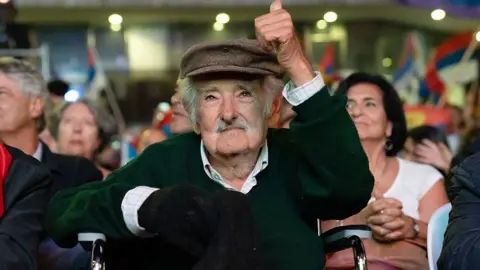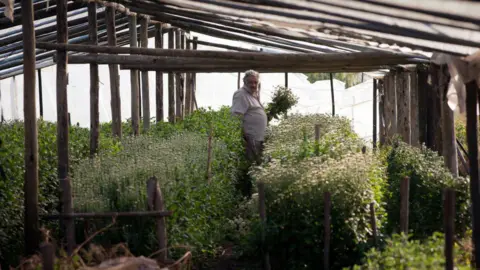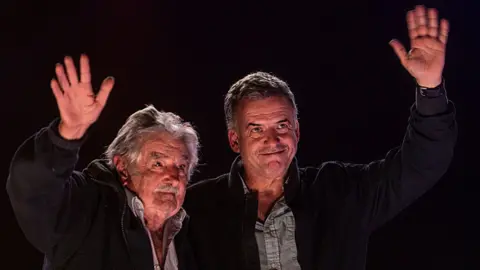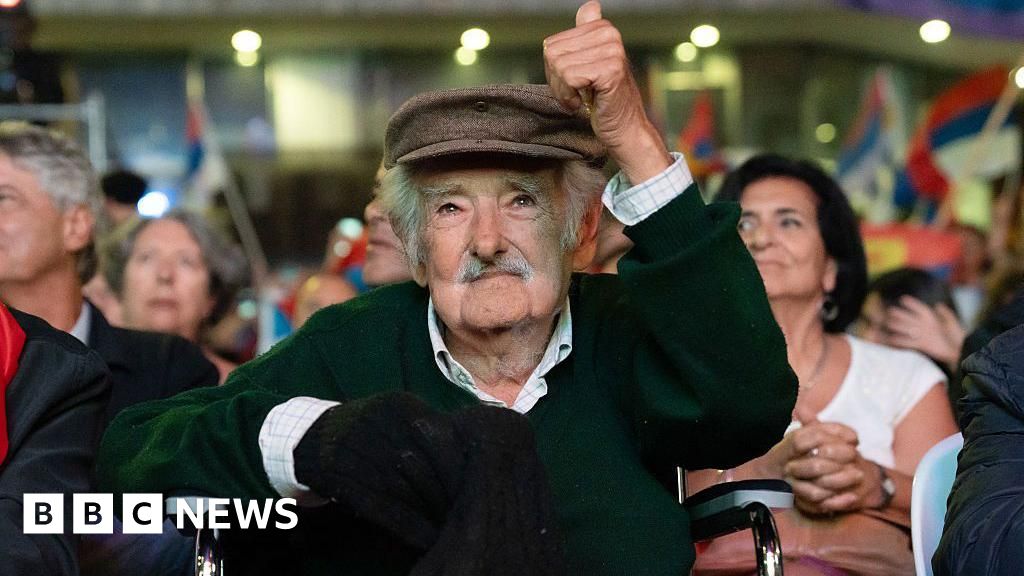BBC News Mundo
 AFP/Getty Images
AFP/Getty ImagesFormer Uruguayan President José Mujica, known as “Pepe”, has died at the age of 89.
The ex-guerrilla who governed Uruguay from 2010 to 2015 was known as the world’s “poorest president” because of his modest lifestyle.
Current President Yamandú Orsi announced his predecessor’s death on X, writing: “thank you for everything you gave us and for your deep love for your people.”
The politician’s cause of death is not known but he had been suffering from oesophageal cancer.
Because of the simple way he lived as president, his criticism of consumerism and the social reforms he promoted – which, among other things, meant Uruguay became the first country to legalise the recreational use of marijuana – Mujica became a well-known political figure in Latin America and beyond.
His global popularity is unusual for a president of Uruguay, a country with just 3.4 million inhabitants where his legacy has also generated some controversy.
In fact, even though many tended to see Mujica as someone outside the political class, that was not the case.
He said his passion for politics, as well as for books and working the land, was passed on to him by his mother, who raised him in a middle-class home in Montevideo, the capital city.
As a young man, Mujica was a member of the National Party, one of Uruguay’s traditional political forces, which later became the centre-right opposition to his government.
In the 1960s, he helped set up the Tupamaros National Liberation Movement (MLN-T), a leftist urban guerrilla group that carried out assaults, kidnappings and executions, although he always maintained that he did not commit any murder.
Influenced by the Cuban revolution and international socialism, the MLN-T launched a campaign of clandestine resistance against the Uruguayan government, which at the time was constitutional and democratic, although the left accused it of being increasingly authoritarian.
During this period, Mujica was captured four times. On one of those occasions, in 1970, he was shot six times and nearly died.
 Getty Images
Getty ImagesHe escaped from prison twice, on one occasion through a tunnel with 105 other MLN-T prisoners, in one of the largest escapes in Uruguayan prison history.
When the Uruguayan military staged a coup in 1973, they included him in a group of “nine hostages” who they threatened to kill if the guerrillas continued their attacks.
During the more than 14 years he spent in prison during the 1970s and 1980s, he was tortured and spent most of that time in harsh conditions and isolation, until he was freed in 1985 when Uruguay returned to democracy.
He used to say that during his time in prison, he experienced madness first hand, suffering from delusions and even talking to ants.
The day he was freed was his happiest memory, he says: “Becoming president was insignificant compared to that.”
 AGENCIA CAMARATRES/AFP via Getty Images
AGENCIA CAMARATRES/AFP via Getty ImagesFrom guerrilla to president
A few years after his release, he served as a lawmaker, both in the Chamber of Representatives and in the Senate, the country’s lower and upper houses respectively.
In 2005, he became minister in the first government of the Frente Amplio, the Uruguayan leftist coalition, before becoming Uruguay’s president in 2010.
He was 74 years old at the time, and, to the rest of the world, still unknown.
His election marked an important moment for the Latin American left, which was already strong on the continent at that time. Mujica became leader alongside other left-wing presidents such as Luis Inácio Lula da Silva in Brazil and Hugo Chávez in Venezuela.
However, Mujica governed in his own way, demonstrating pragmatism and audacity on several occasions, political commentators say.
During his administration, amid a fairly favourable international context, the Uruguayan economy grew at an average annual rate of 5.4%, poverty was reduced, and unemployment remained low.
Uruguay also drew global attention for the social laws passed by parliament during those years, such as the legalisation of abortion, the recognition of same-sex marriage, and state regulation of the marijuana market.
While in office, Mujica rejected moving into the presidential residence (a mansion), as heads of state around the world usually do.
Instead, he remained with his wife – politician and former guerrilla Lucía Topolansky – in their modest home on the outskirts of Montevideo, with no domestic help and little security.
This combined with the fact that he always dressed casually, that he was often seen driving his light blue 1987 Volkswagen Beetle and gave away a large portion of his salary, led some media outlets to call him “the world’s poorest president”.
But Mujica always rejected that title: “They say I’m the poorest president. No, I’m not,” he told me in a 2012 interview at his home. “Poor are those who want more […] because they’re in an endless race.”
Despite Mujica preaching austerity, his government did significantly increase public spending, widening the fiscal deficit and leading his opponents to accuse him of waste.
Mujica was also criticised for failing to reverse the growing problems in Uruguayan education, despite having promised that education would be a top priority for his administration.
However, unlike other leaders in the region, he was never accused of corruption or of undermining his country’s democracy.
By the end of his administration, Mujica had a high domestic popularity rating (close to 70%) and was elected senator, but also spent part of his time travelling the world after he stepped down as president.
“So what it is that catches the world’s attention? That I live with very little, a simple house, that I drive around in an old car? Then this world is crazy because it’s surprised by [what is] normal,” he reflected before leaving office.
 Getty Images
Getty ImagesMujica retired from politics in 2020 though he remained a central figure in Uruguay.
His political heir, Yamandú Orsi, was elected president of Uruguay in November 2024 and his group within the Frente Amplio obtained the largest number of parliamentary seats since the country’s return to democracy.
Last year, Mujica announced he had cancer and references to his age and the inexorable proximity of death became more frequent – but he always accepted the final outcome as something natural, without drama.
In the last interview he gave the BBC in November last year, he said: “One knows that death is inevitable. And perhaps it’s like the salt of life.”

